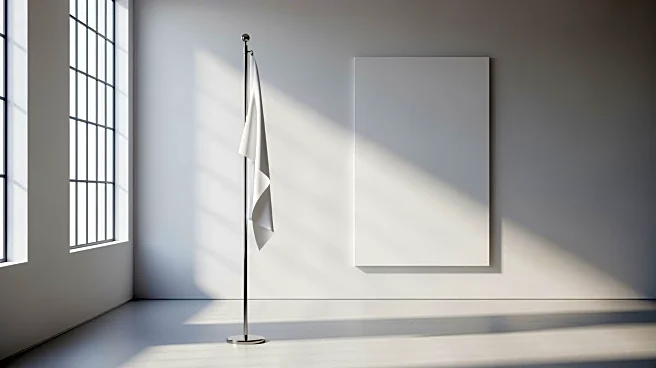What's Happening?
The Palais de Tokyo in Paris recently opened an exhibition titled 'Echo. Delay. Reverb. American Art, Francophone Thoughts,' curated by Naomi Beckwith. The exhibition faced immediate controversy when Cameron Rowland's artwork, 'Replacement,' was removed.
The piece involved swapping the French flag outside the building with the Martinican flag, which carries a complex history tied to anticolonial activism. The removal was justified by the institution's director as a measure to uphold the principle of neutrality, a rule emphasized by France's former home secretary, Bruno Retailleau. This principle prohibits the display of symbols expressing political, religious, or philosophical claims on public buildings. Despite legal advice suggesting the flag did not violate neutrality principles, the artwork was censored, leaving only a label explaining its removal.
Why It's Important?
This incident highlights the tension between art institutions and political regulations, particularly in the context of expressing critical discourse. The removal of Rowland's artwork underscores the selective application of neutrality principles, which can stifle artistic expression and critique. It reflects broader societal issues regarding freedom of expression and the role of art in challenging political norms. The controversy may influence future exhibitions and the willingness of institutions to engage with politically charged artworks, impacting artists and audiences seeking to explore complex historical and cultural narratives.
What's Next?
The removal of Rowland's artwork may prompt discussions among artists, curators, and legal experts about the boundaries of artistic expression in public spaces. Institutions might reconsider their policies on displaying politically sensitive works, potentially leading to changes in how art is curated and presented. The controversy could also inspire artists to find new ways to engage with political themes, either through more subtle expressions or by challenging existing regulations. Stakeholders in the art community may advocate for clearer guidelines that balance artistic freedom with legal constraints.
Beyond the Headlines
The incident at Palais de Tokyo raises questions about the role of art in society and its ability to provoke thought and dialogue. It highlights the ethical considerations of censorship and the power dynamics between artists and institutions. The selective enforcement of neutrality principles may reflect broader cultural and political shifts, influencing how art is perceived and valued. This event could contribute to ongoing debates about the intersection of art, politics, and public policy, encouraging a reevaluation of how art can serve as a catalyst for social change.















